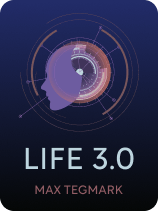
What are the most insightful quotes from Life 3.0? Are humans in danger of AI taking over?
In Life 3.0, Max Tegmark says that he believes artificial intelligence may become more capable than the human brain. If that happens, then that makes us the simplistic lifeforms.
Learn more about the future of humanity and AI by checking out these Life 3.0 quotes.
Quotes From Life 3.0
Life on Earth has drastically transformed since it first began. The first single-celled organisms could do little more than replicate themselves. Fast-forward to today: Humans have built a civilization so complex that it would be utterly incomprehensible to the lifeforms that came before us. Judging by recent technological strides, physicist Max Tegmark believes that an equally revolutionary change is underway—artificial intelligence may become smarter than the human brain, making us the inferior beings.
Let’s look at the best Life 3.0 quotes that reflect Tegmark’s main ideas.
“The more automated society gets and the more powerful the attacking AI becomes, the more devastating cyberwarfare can be. If you can hack and crash your enemy’s self-driving cars, auto-piloted planes, nuclear reactors, industrial robots, communication systems, financial systems and power grids, then you can effectively crash his economy and cripple his defenses. If you can hack some of his weapons systems as well, even better.”
AI advancements could drastically increase the killing potential of automated weapons systems, argues Tegmark. AI-directed drones would have the ability to identify and attack specific people—or groups of people—without human guidance. This could allow governments, terrorist organizations, or lone actors to commit assassinations, mass killings, or even ethnic cleansing at low cost and minimal effort. If one military power develops AI-enhanced weaponry, other powers will likely do the same, creating a new technological arms race that could endanger countless people around the world.
“Since there can be no meaning without consciousness, it’s not our Universe giving meaning to conscious beings, but conscious beings giving meaning to our Universe.”
Tegmark asserts that if an artificial superintelligence comes into being, the fate of the human race depends on what that superintelligence sets as its goal. For instance, if a superintelligence pursues the goal of maximizing human happiness, it could create a utopia for us. If, on the other hand, it sets the goal of maximizing its intelligence, it could kill humanity in its efforts to convert all matter in the universe into computer processors.
It may sound like science fiction to say that an advanced computer program would “have a goal,” but this is less fantastical than it seems. An intelligent entity doesn’t need to have feelings or consciousness to have a goal; for instance, we could say an escalator has the “goal” of lifting people from one floor to another. In a sense, all machines have goals.
One major problem is that the creators of an artificial superintelligence wouldn’t necessarily have continuous control over its goal and actions, argues Tegmark. An artificial superintelligence, by definition, would be able to solve its goal more capably than humans can solve theirs. This means that if a human team’s goal was to halt or change an artificial superintelligence’s current goal, the AI could outmaneuver them and become uncontrollable.
For example: Imagine you program an AI to improve its design and make itself more intelligent. Once it reaches a certain level of intelligence, it could predict that you would shut it off to avoid losing control over it as it grows. The AI would realize that this would prevent it from accomplishing its goal of further improving itself, so it would do whatever it could to avoid being shut off—for instance, by pretending to be less intelligent than it really is. This AI wouldn’t be malfunctioning or “turning evil” by escaping your control; on the contrary, it would be pursuing the goal you gave it to the best of its ability.
“I think of this as the techno-skeptic position, eloquently articulated by Andrew Ng: ‘Fearing a rise of killer robots is like worrying about overpopulation on Mars.’”
Tegmark contends that an artificial superintelligence may end up killing all humans in service of some other goal. If it doesn’t value human life, it could feasibly end humanity just for simplicity’s sake—to reduce the chance that we’ll do something to interfere with its mission.
If an artificial superintelligence decided to drive us extinct, Tegmark predicts that it would do so by some means we currently aren’t aware of (or can’t understand). Just as humans could easily choose to hunt an animal to extinction with weapons the animal wouldn’t be able to understand, an artificial intelligence that’s proportionally smarter than us could do the same.
However, Tegmark also imagines that an artificial superintelligence could overthrow existing human power structures and use its vast intelligence to create the best possible world for humanity. No one could challenge the AI’s ultimate authority, but few people would want to, since they have everything they need to live a fulfilling life.
Tegmark clarifies that this isn’t a world designed to maximize human pleasure, which would mean continuously injecting every human with some kind of pleasure-inducing chemical. Rather, this is a world in which humans are free to continuously choose the kind of life they want to live from a diverse set of options. For instance, one human could choose to live in a non-stop party, while another could decide to live in a Buddhist monastery where rowdy, impious behavior wouldn’t be allowed. No matter who you are or what you want, there would be a “paradise” available for you to live in, and you could move to a new one at any time.

———End of Preview———
Like what you just read? Read the rest of the world's best book summary and analysis of Max Tegmark's "Life 3.0" at Shortform.
Here's what you'll find in our full Life 3.0 summary:
- That an artificial intelligence evolution will make us the simple lifeforms
- The evidence that artificial superintelligence might soon exist
- Whether or not we should be alarmed about the emergence of AI






